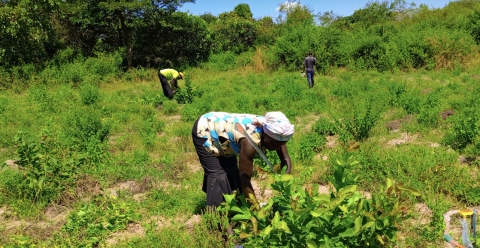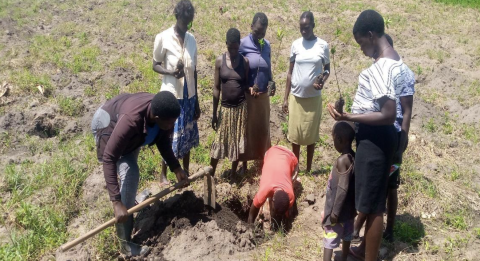App tailors climate smart intervention for Ugandan smallholders
App tailors climate smart intervention for Ugandan smallholders
In Uganda's Moyo district, Veronica Matio showcases thriving beans under shaded trees, employing Farmer Managed Natural Regeneration. Moyo District Farmers’ Association aids farmers with climate-smart practices, fostering resilience and community cohesion. This story is part of a series celebrating the locally-led solutions supported by the UNDP implemented - Adaptation Fund Climate Innovation Accelerator programme.
In Arapi village, in Uganda’s Moyo’s district, Veronica Matio shows off her beans. They are thriving in the shade of the trees dotted around the planted rows.
“The beans you see under the shade seem to be performing better because of the build up of nutrients from decomposing leaves,” she says in her home language, during an interview with the Moyo District Farmers’ Association (MDFA).
MDFA has been encouraging its community of agricultural extension workers and farmers like Matio to build resilience to tough and unpredictable weather conditions by naturally restoring and conserving their land.
This natural approach is known in academic circles as farmer managed natural regeneration, or FMNR.
“When a farmer adopts FMNR, you grow crops with the trees, and we call that system farmland,” explains Justine Mawadri, a climate smart expert at MDFA.

In woodlands farmers would manage tree conservation, and in rangelands, farmers would integrate animal rearing with sustainable land management.
He says FMNR, which is a quick, affordable and easy-to-replicate way to restore and manage trees and shrubs, has been shown to alleviate poverty among subsistence farmers in developing countries.
This is critical for Uganda, where natural resources and farm productivity has declined due to bush burning, poor water management and cutting down trees for firewood, construction materials and to make space for agricultural land.
MDFA reports that in the Moyo and Obongi districts where they work, these problems have exacerbated food insecurity, conflicts and gender based violence. Many of the communities they work with also host several refugees, who often struggle to integrate.
Mawadri says MDFA wants to make a positive impact across all of these connected issues. “We are climate proofing our members, which are both refugees and their host communities,” he says.
MDFA used a grant from the Adaptation Fund and European Union, which supports climate innovation in developing countries through its UNDP-Adaptation Fund Climate Innovation Accelerator (AFCIA) programme, to train over 20 extension officers to use the Climate Agri Solutions app.
“You can assess a farmer for his or her climate related risks,” says Mawadri. If a farmer has a drought problem, he explains, the app provides a list of climate-related questions. It then uses the answers to those questions to “calculate” the best practices for that farmer.
The extension officers were trained by MDFA on the app, FMNR and other climate smart practices like irrigation with plastic water bottles or mulching, then passed on the information and assisted the farmers they serve.

In one instance, a group of farmers who were only growing tomatoes in the rainy season, were shown by extension workers how to become less dependent on the seasons.
“They trained the farmers after we trained them. They put the things they learnt into practice - they were trained on soil and water conservation practices, and also on planting a drought tolerant variety.”
That year, the farmers were able to produce tomatoes in the off-season for the first time. Given that most farmers are not producing off-season, he says, they were able to earn more income than before with that harvest.
“From the revenue they generated, they were able to buy their own seeds and expand their production area.”
In another case, farmers had previously considered mulch much of a muchness.
“But when they were able to apply the technology of mulching in their garden, and also carrying out irrigation using the nearby stream, they realised they were under-utilising the resources available,” says Mawadri.
Speaking to MDFA, farmer John Ambama says that mulching with grass is helpful amid climate change. “It helps in the dry season to hold moisture. The mulch also suppresses weeds and makes the crops grow faster.”
There are over 60 climate-related logics within the app, says Mawadri, which will hopefully be able to address all the common issues that farmers face.
“We have [also] tried to incorporate economic models into it. So that as much as farmers will be conserving the environment, they will also be earning money,” says Emmanual Iranya, an MDFA coordinator. “The whole system is very rewarding to the farmers and it becomes sustainable.”
Mawadri says the farming community in general has responded very positively to the FMNR interventions. “They appreciated the knowledge and skills acquired, and they were happy and excited about the new confidence that has been built.”
For him, the biggest success of the project lies in the way refugees and their host community started working together peacefully and in harmony. He says in many other cases, conflict and strife over natural resources ensue, but this time they succeeded in promoting inclusion and cooperation.
At Veronica Matio’s tree-lined bean plantation, leaves are happily left to fall to the ground.
“A farmer should not cut down all the trees in their farm,” she says. “Leave some to decompose into the soil, and you will benefit.”
About this article
This story has been co-created with the support of MDFA, UNDP, CDKN, ICCCAD, and GRP, under the framework of the UNDP-managed Adaptation Fund Climate Innovation Accelerator (AFCIA).
The UNDP-AFCIA programme counts on financial contributions from the Adaptation Fund and the European Union and has awarded 44 micro and small grants to locally-led organisations across 33 countries worldwide, accelerating their innovative solutions to build resilience in the most vulnerable communities.
UNDP-AFCIA, is one of the funding windows anchored under the Adaptation Innovation Marketplace (AIM), a multi-stakeholder strategic platform that promotes scaled-up adaptation at the local level, launched by UNDP Administrator Achim Steiner at the Climate Adaptation Summit in January 2021.
